The Yu-Gi-Oh! trading card game debuted in the late '90s to worldwide success. Over 20 years after its initial release, the trading card game still enjoys a broad popularity, and new cards are regularly added to the deck. It's a complex game that appeals to people of all ages, and moreover, Yu-Gi-Oh! isn't just a card game: it's also a popular anime.
Much of the card game's original Japanese art contains contentious imagery. Since the game and anime can be easily accessed by children, and because Japanese censorship standards differ greatly from the rest of the world's, many of the original Japanese card art and names were changed for international versions to avoid any potential controversy.
10. Dark Magician Was Originally Named Black Magician
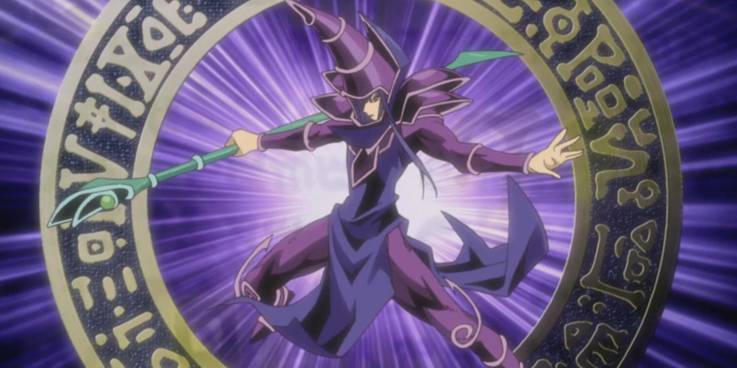
Most Yu-Gi-Oh! cards have some clear reason or logic as to why they were censored, but there's no clearly understood reason why Black Magician's name was changed. This card's name remains "Black Magician" in Japan but was edited to "Dark Magician" in the international release. While there's no distinct reason for this card being censored, it might be due to the potential tie-in to "black magic," which could carry a negative connotation. Consequently, many other cards tied to Black Magician also had their names changed to match Dark Magician.
9. The Destiny Board Is Actually Meant To Feature A Ouija Board & The Word "Death"
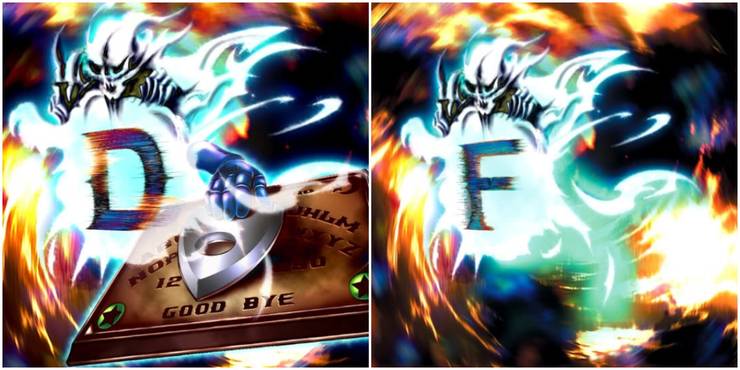
Many international versions of Yu-Gi-Oh! cards shy away from any references to religion or the occult, and Destiny Board is no exception. This is a continuous trap card that will let players win the duel if they manage to spell out "DEATH" by using the rest of the Spirit Message cards. The Japanese card art features a ouija board, but it was taken out of the card art for the international version. Additionally, the word "DEATH" was changed to "FINAL," so each Spirit Message card was changed accordingly.
8. Psychic Commander Was Edited To Avoid Promoting Nazism
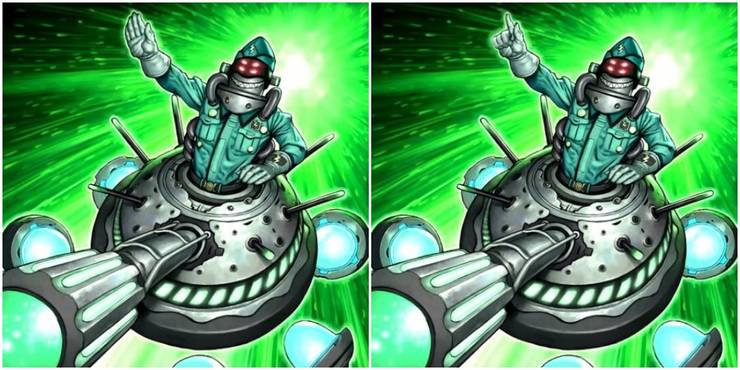
Not only is Psychic Commander sitting inside a military tank apparatus, but he's also got his right hand lifted up in what resembles a Nazi salute. In the international version, Psychic Commander's hand was edited to show only one pointing finger.
Yu-Gi-Oh: 10 Ways Seto Kaiba Ruined His Likability
The original image definitely carries heavy connotations to Nazi imagery, so it makes sense that this card was changed. Interestingly, the original card art appears in the English version of Yu-Gi-Oh! 5D's anime.
7. Exodia's Art Was Edited To Prevent Any Connection To Pentagrams Or Ankhs
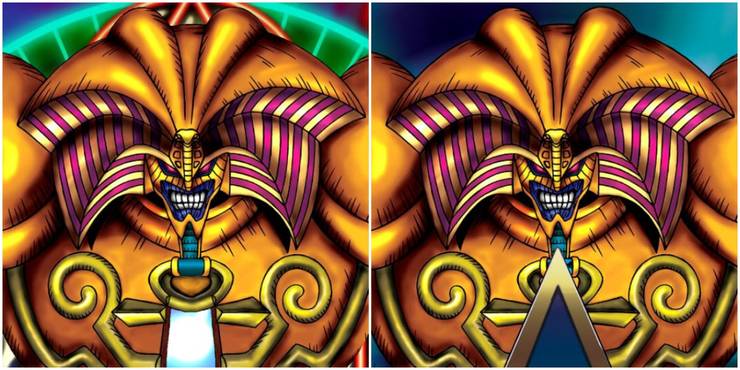
Keeping with the habit of avoiding any sensitive religious subjects, Exodia the Forbidden One's card art was changed to remove potentially-sensitive imagery. The original card art shows a star in the background behind Exodia, as well as an ankh hanging from Exodia's chest. To avoid any controversy, the international card art changed the background star to the Spellbinding Circle and the ankh on its chest was edited to make it less obvious.
6. Dark Ruler Ha Des Had His Horns & Wine Glass Edited
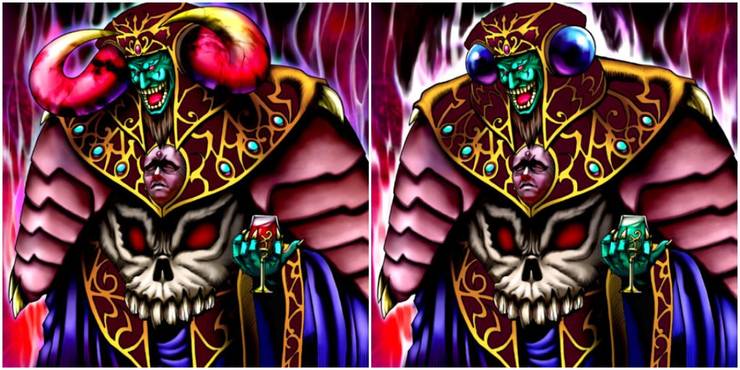
This is another card that carries connotations with negative religious imagery. The original card art for Dark Ruler Ha Des has large, curved horns resembling a devil, and he holds a glass of red-colored liquid. In the international card art, Ha Des's red horns were replaced with blue orbs. On top of that, the liquid in his glass was changed from red to green, in order to prevent it from being mistaken for wine or blood.
5. Exile Of The Wicked Removed Imagery Of A Crucifix & A Bible
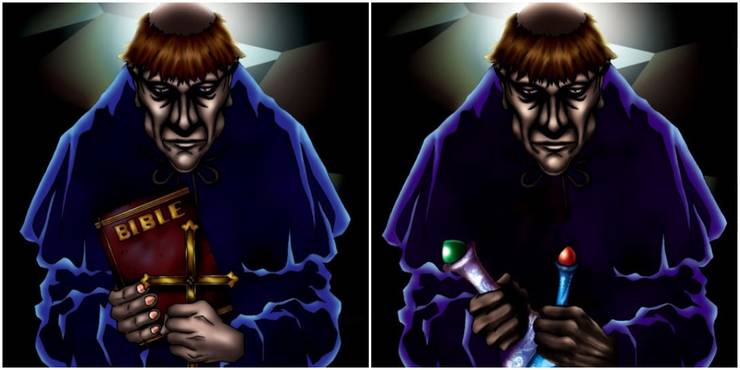
Exile of the Wicked is heavy with religious imagery, as the original Japanese card art features a medieval monk with a shaved pate clutching a Bible and a crucifix to his chest. The international card art features the monk holding what appears to be a couple of potion bottles instead. It's unclear what's in the bottles or how they'll help exile anything wicked. Perhaps they're full of holy water.
4. Dramatic Rescue's Original Artwork Was Dramatically Altered
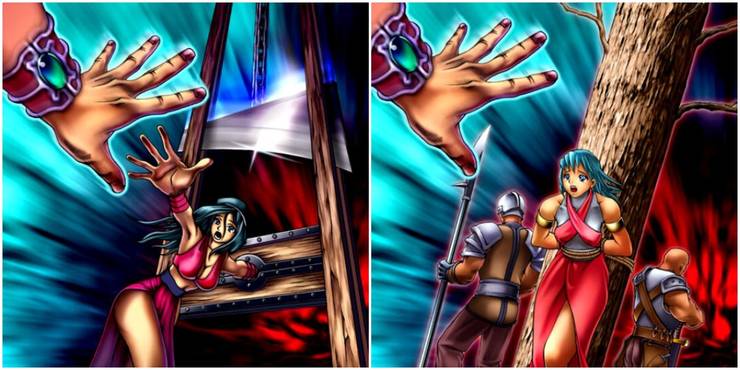
The Japanese card art for Dramatic Rescue features a scantily clad woman with her arm stuck in a guillotine, reaching frantically for help as the blade comes crashing down. The imagery is pretty graphic and suggestive, so the international version was completely redrawn to remove any imagery of senseless cruelty.
Yu-Gi-Oh!: 10 Stunning Rare Ghost Cards
The guillotine was removed entirely, and the girl is tied up to a tree instead, with a couple of guards standing watch. Furthermore, her clothes were edited to cover more of her body and her breast size was reduced.
3. Last Day Of Witch Removed References To The Salem Witch Trials
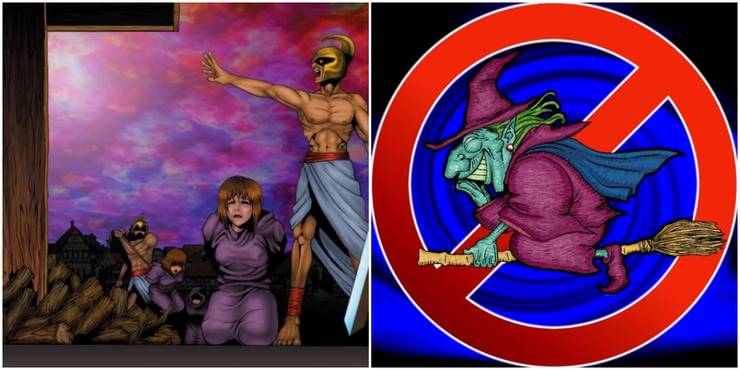
The Japanese artwork for Last Day of Witch features a few robed women on their knees with their hands tied behind their backs as guards look on. To make matters worse, there's a wooden cross with kindling at its base in the foreground, suggesting these women are going to be burned at the stake. This image was removed entirely and replaced with a comical image of a cartoonish witch. This is one of the more radically-changed cards in the Yu-Gi-Oh! library.
2. Dark Magician Girl's Bust Was Reduced & Her Pentagram Was Removed
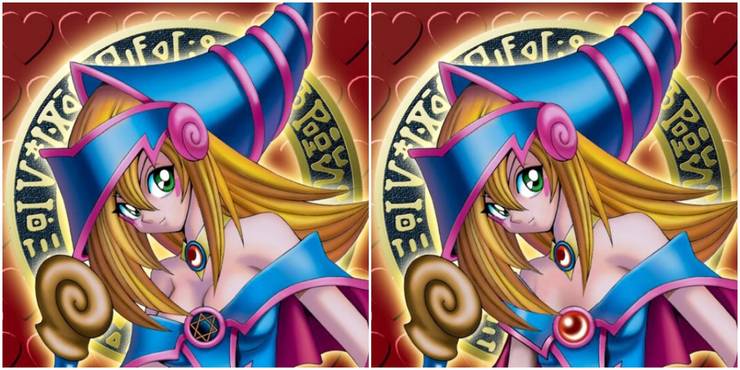
Dark Magician Girl's card changes have been a long-lasting point of contention amongst Yu-Gi-Oh! fans, since she's been part of the game from the very beginning. Not only was her cleavage edited to be less suggestive, but the pentagram on her chest was removed entirely and replaced with a shiny red stone. This makes Dark Magician Girl a controversial card for two reasons: first, she was censored for her breasts being too sexually suggestive, and then, the pentagram was censored for religious connotations.
1. Number 41: Bagooska The Terribly Tired Tapir Was Originally Passed Out With Alcohol
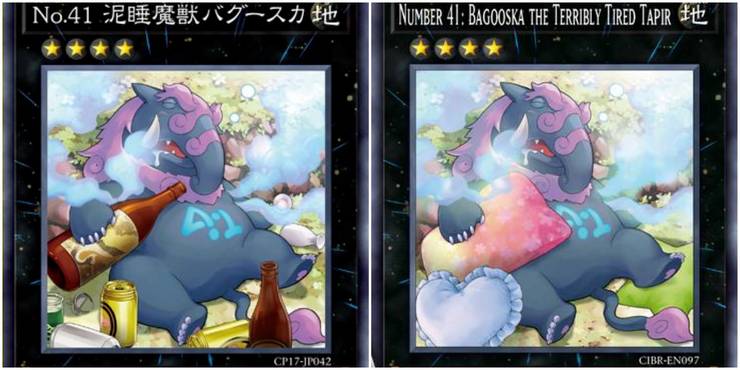
The Japanese art for this card features a stylized tapir sleeping peacefully while clutching a bottle of sake, or Japanese rice wine. Moreover, there are several other bottles and cans of beer and sake scattered around Bagooska's feet. To avoid promoting alcoholism, the international version of this card replaced the bottles and cans with pillows. Instead of looking like a drunkard dozing after getting too deep into his cups, Bagooska's international card art looks like a cozy tapir having a peaceful nap.
Source: cbr.com


Leave a comment